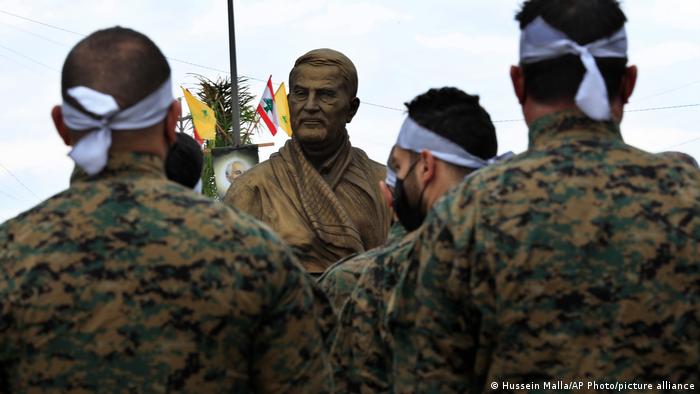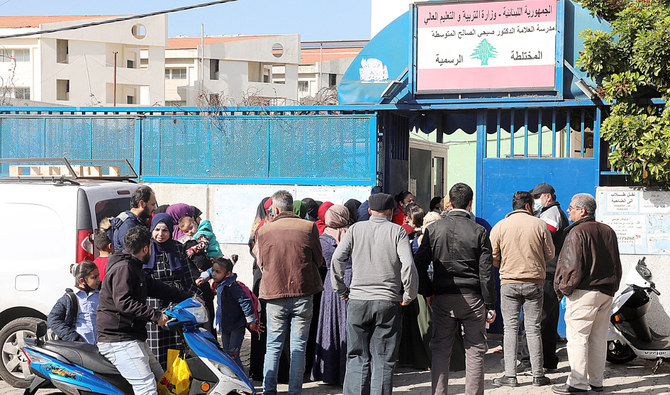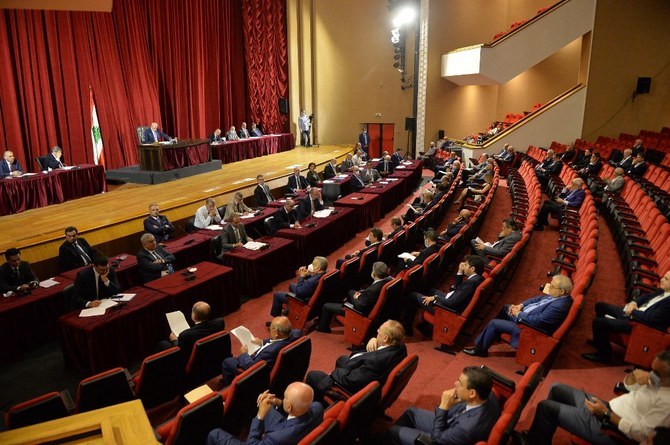
Opposition candidates in the upcoming parliamentary election accuse supporters of traditional parties of disrupting their campaigns.
aljazeera.com -- Kareem Chehayeb --Beirut, Lebanon – Hicham Hayek knew supporters of Lebanon’s traditional political parties would oppose his parliamentary election campaign in southern Lebanese village of Sarafand, but he did not expect that he, his running mates and attendees would be beaten, with the Lebanese army having to escort them to safety. Hayek, a medical surgeon running in the May 15 election under the slate Together For Change, told Al Jazeera that supporters of Hezbollah and its ally the Amal Movement had beaten up workers at the venue before he arrived for the event on April 16. “And as we approached the venue we saw that they had closed off the road leading to the event with tires, and they were yelling at people, attacking them and insulting them,” he said.
Southern Lebanon is a key political bastion for Iran-backed Hezbollah and Amal Movement, whose leader Nabih Berri has been speaker of parliament since 1992. “They threw rocks at us, and told us: ‘This is Nabih Berri’s territory’,” Soltan al-Hosseini, a student activist that supports Hayek. “They accused us of being foreign agents.” The candidates and supporters who made it inside the venue tried to hold the event, but more angry people showed up. “Some people tried to reason with [them], and asked them to open the road, but they were only beaten up,” Hayek said. “Then one of them took out a handgun and fired towards us.”
The army escorted Hayek and the others outside to leave safely, while those in the venue had to leave by driving on a dirt road to make it out of the area. Amal Movement, in a statement soon after the incident, denied their involvement. The army has arrested a man accused of shooting at the group, after activist lawyers fired a legal complaint. However, Amal supporters have demonstrated for his release by blocking a highway in the southern town with large piles of dirt and burning tyres.

By Najia Houssari -- arabnews.com -- BEIRUT: A sudden upheaval in Lebanon's exchange rate has angered people ahead of parliamentary elections. Economist Louis Hobeika said the turmoil should motivate people to “vote for change and not re-elect those in power.” He told Arab News that the ruling parties had all the time they needed to issue laws but did nothing. The Lebanese pound hit a sudden low, trading at LBP28,000 to the dollar on Friday, with the country on official holidays until Tuesday for Orthodox Easter. The exchange rate turmoil caused a clamor in the markets, as people said on social media that shop owners had already started pricing goods based on a rate of LBP30,000 to the dollar.
Protesters cut off the southern highway with burning tires, denouncing the deteriorating living conditions, Lebanon’s National News agency reported. Electricite du Liban, the state-owned electricity supplier, said on Thursday that the Deir Ammar power plant had shut down. The Zahrani power plant shut down last week, leaving the Lebanese with no electricity supply until a ship carrying a fuel delivery is unloaded and tested. Subscription fees for private generators that are charged in dollars continue to rise. The two plants depend exclusively on Iraqi fuel as part of an agreement concluded between the two countries last August. The state is unable to secure dollars to import additional quantities of fuel, while the agreement to draw electricity from Jordan and gas from Egypt is yet to be implemented. According to the agreement with Iraq, every month only one shipment of 40,000 tons of gas oil is supplied to Lebanon, for the benefit of EDL.

سجعان قزي
@AzziSejean
تُقبِلُ الانتخاباتُ النيابيّةُ في لبنان مُطوَّقةً خارجيًّا بمؤتمرِ فيينا وانتفاضةِ المسجِدِ الأقصى وحربِ أوكرانيا والتطبيعِ العربيّ وزيارةِ البابا فرنسيس، وتأتي داخليًّا مُهدَّدةً بقانونِ انتخابٍ هَجينٍ ومرشَّحين كُثرٍ هواةٍ والتفافٍ على تصويتِ المغتربين وانهيارٍ زاحفٍ وفَقرٍ منتَشرٍ وانتخاباتٍ رئاسيّةٍ مُثقلَةٍ بالمخاطرِ وصراعٍ وطنيٍّ حولَ وجودِ لبنان. واقعُ الانتخاباتِ يُحرّضُ على التصويتِ بورقةٍ بيضاء، لكنَّ مصيرَ لبنان يُشجِّعُ على المشاركةِ الكثيفةِ حِفاظًا على لبنانَ وطنًا ودولةً وهُويّة. الصوتُ هذه المرّةَ بندقيّة. لا نختارُ بين لوائحَ بل بين لُبنانات.
في هذا السياق، إلى أيِّ مدى يَحضُرُ الحِسُّ الوطنيُّ في لحظةِ الخِيارِ الانتخابيّ؟ كان الفيلسوفُ النمساويُّ لودفيغ فتغنشتاين Ludwig Wittgenstein (1889-1951) يُردِّد: "لستُ رجلًا مُتديّنًا، لكنْ لا مَناصَ مِن النظرِ إلى كلِّ قضيّةٍ تواجِهُني من زاويةٍ دينيّة". الترجمةُ اللبنانيّةُ لهذا القول هي: إلى أي مدى يَصعُبُ على المواطن، مهما كان انتماؤه، أن يَتجاوزَ الحِسَّ الوطنيَّ لحظةَ الخِيار الانتخابيِّ؟ وما مدى غَلَبةِ مصلحةِ الوطنِ على مصالحِ المواطنِ في هذا الزمنِ الرديء؟ أثناءَ صلاةِ الجمعةِ العظيمةِ اسْتقرّت في ذاكرتي عبارةُ: " شَبِعَتْ من البَلايا نفْسي، ودَنَتْ من الجحيمِ حياتي". بتعبيرٍ لبناني، معاناةُ المواطنِ في هذه المرحلةِ تَـمَزُّقُهُ بين أوْلويَّتين: وَجعُه ووجعُ الوطن.

By Najia Houssari - arabnews.com -- BEIRUT: The Lebanese parliament’s session was adjourned on Wednesday after protesting depositors threw stones at deputies and insulted them for continuing to discuss the capital control bill. The government amended the draft bill and sent it to parliament for a second time, but no agreement was reached and the session was cut short. Formal capital controls are an International Monetary Fund policy recommendation, and Lebanon hopes to secure an IMF aid package after its financial system imploded in 2019, paralyzing the banking system and freezing depositors out of their US dollar accounts. Some politicians from the Lebanese Forces Party and the Free Patriotic Movement refused to discuss the draft law before reviewing the “economic recovery plan,” which they say “is trying to swallow up the rights of depositors.”
George Adwan, the head of the Parliamentary Administration and Justice Committee, said: “The plan will write off $60 billion of debt, and the depositors will bear the losses.” He called for “a plan that defines responsibilities first, and then searches for capital control,” adding that any research “outside the path of determining responsibilities and distributing losses means taking the country into the unknown.” Ibrahim Kanaan, head of the Parliamentary Budget Finance Committee, said: “How can we freeze the deposits while we do not know what is left of them? People have rights that must be preserved. The depositor should not be held responsible for the state’s wear and tear, but rather the Bank of Lebanon, private banks and the state.” Meanwhile, Elie Ferzli, the deputy parliament speaker, defied depositors who were protesting in the street by ramming them with his car as he drove into the parliament courtyard. They responded by throwing stones and shouting at him. Footage of the incident went viral on social media. As he was leaving the meeting hall, Ferzli mocked the protesters, telling a journalist he was “ready to do it again.”
Khazen History


Historical Feature:
Churches and Monasteries of the Khazen family

St. Anthony of Padua Church in Ballouneh
Mar Abda Church in Bakaatit Kanaan
Saint Michael Church in Bkaatouta
Saint Therese Church in Qolayaat
Saint Simeon Stylites (مار سمعان العامودي) Church In Ajaltoun
Virgin Mary Church (سيدة المعونات) in Sheilé
Assumption of Mary Church in Ballouneh
1 - The sword of the Maronite Prince
2 - LES KHAZEN CONSULS DE FRANCE
3 - LES MARONITES & LES KHAZEN
4 - LES MAAN & LES KHAZEN
5 - ORIGINE DE LA FAMILLE
Population Movements to Keserwan - The Khazens and The Maans
ما جاء عن الثورة في المقاطعة الكسروانية
ثورة أهالي كسروان على المشايخ الخوازنة وأسبابها
Origins of the "Prince of Maronite" Title
Growing diversity: the Khazin sheiks and the clergy in the first decades of the 18th century
Historical Members:
Barbar Beik El Khazen [English]
Patriach Toubia Kaiss El Khazen(Biography & Life Part1 Part2) (Arabic)
Patriach Youssef Dargham El Khazen (Cont'd)
Cheikh Bishara Jafal El Khazen
Patriarch Youssef Raji El Khazen
The Martyrs Cheikh Philippe & Cheikh Farid El Khazen
Cheikh Nawfal El Khazen (Consul De France)
Cheikh Hossun El Khazen (Consul De France)
Cheikh Abou-Nawfal El Khazen (Consul De France)
Cheikh Francis Abee Nader & his son Yousef
Cheikh Abou-Kanso El Khazen (Consul De France)
Cheikh Abou Nader El Khazen
Cheikh Chafic El Khazen
Cheikh Keserwan El Khazen
Cheikh Serhal El Khazen [English]
Cheikh Rafiq El Khazen [English]
Cheikh Hanna El Khazen
Cheikha Arzi El Khazen
Marie El Khazen